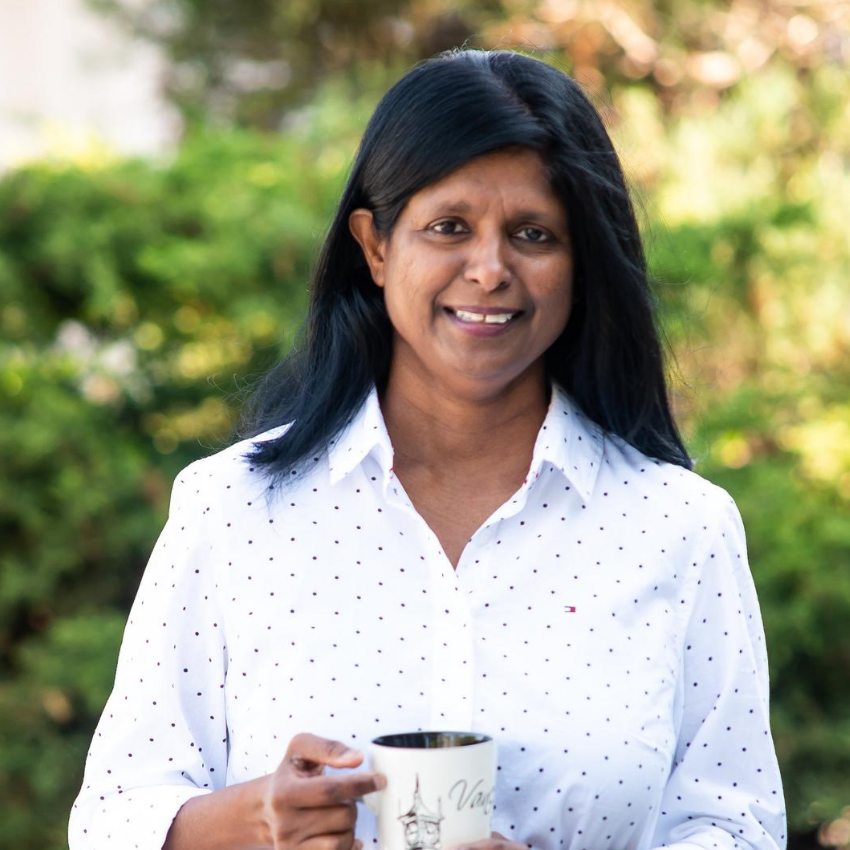By…
How Geetha Moorthy Began Working with Children on the Autism Spectrum — and Built SAAAC Autism Centre to Serve Their Needs
2019 Social Change Award Winner

By Karen van Kampen
In 1983, two days after her wedding, 23-year-old Geetha Moorthy and her family fled Sri Lanka in the midst of a civil war, landing in Canada as refugees. Trained as an accountant, Geetha worked as a bookkeeper, but one job wasn’t enough to cover living expenses. So Geetha started teaching Indian Classical dance. “That’s my passion,” she says.
As Geetha’s dance school grew, she says, “I wanted to give back to the community that accepted us. I was so thankful to Canada.”
Geetha choreographed dance shows for different charities and non-profits and had an opportunity to work with children on the autism spectrum. Geetha learned that many individuals had never had treatment, and she also discovered a stigma associated with autism spectrum disorder. Some parents wouldn’t even say the word autism.
“I thought, I have to do something about it,” she says. “I can teach them a little bit of math and English in my dining room, and I can teach dance in my basement.” In 2009, Geetha taught four students in her home. Today, with the help of 30 staff and more than 200 volunteers, Geetha provides programs for more than 400 families at SAAAC Autism Centre, an 11,000-square-foot facility in Toronto.
As founder and executive director of SAAAC, Geetha was the 2019 winner of the Social Change Award, a category of the RBC Canadian Women Entrepreneur Awards that recognizes an exceptional leader of a registered charity, not-for-profit or social enterprise that is dedicated to their unique brand of social change. The SAAAC provides the autism community resources, workshops and caregiver support while celebrating the strengths of those on the autism spectrum. “We want to see their positives and take them to the next level,” says Geetha.
In the beginning, SAAAC helped mostly South Asian families with their own unique challenges. “The caregivers were facing a lot of barriers — from financial to language to the stigma in communities,” says Geetha. It was difficult to navigate services and information on autism for caregivers whose first language was not English.
“They were suffering in silence,” says Geetha. People would blame the parents of children with autism spectrum disorder, she says, adding that families felt “ashamed to include their children in community life.” When the SAAAC expanded to serve families outside the South Asian community, they found that common issues brought families together.
In 2009, Geetha ran programs out of her home and in local parks. Within a year, she had 25 students with another 25 on a waiting list. Geetha realized that she needed more space as well as evidence-based therapies including occupational, language and speech therapies in addition to her arts programs. She held a fundraising gala and used the proceeds to hire a few part-time therapists.
In the beginning, Geetha found it difficult to ask for donations. “I was very shy. I was afraid to ask for help,” she says. Looking back, Geetha encourages others not to be stopped by the same roadblock — even if you might get no for an answer.
“If you have faith in yourself, you have nothing to lose and everything to gain.”
A friend offered his consulting office to run SAAAC’s free programs after hours and on weekends. Geetha created a volunteer program in which volunteers were trained by SAAAC’s therapists. But Geetha knew that she couldn’t continue to run the SAAAC while also working full-time. “If one person doesn’t 100 per cent focus on something,” she says, “it’s not going to happen.”
In 2011, Geetha quit her accounting job at a printing company and followed her passion to help others. For the next four years, Geetha volunteered full-time and didn’t get paid until 2015. “I’m a risk taker. I believe in myself most of the time. I think, I can do this,” says Geetha, adding that her passion was her driving force. While the SAAAC faced financial challenges, Geetha never stopped believing in her vision.
The lessons she learned? Stay focused, invest in yourself, and gain knowledge in order to reach your goal. “You never know the limit to how much you can achieve until you take the next step and try,” she says.
In 2012, the SAAAC received charity status. The organization’s funding includes reasonably priced fee-for-service, fundraising events and federal, provincial and city contributions. In 2017, the SAAAC moved to an 11,000-square-foot facility in Toronto where Geetha and her team run a dozen free and fee-for-service programs including ABA therapy, speech and language, and school readiness.
In 2019, the SAAAC launched The Goodness Gift, a social enterprise that supports the employment of adults on the autism spectrum, training individuals on inventory, order processing, and making and delivering gift baskets. Geetha aims to have 12 employees by year three and plans to roll out the program nationally. “We want every single person on the spectrum to be employed,” says Geetha. “They have to lead a meaningful life.”
Looking to the future, Geetha hopes to expand some SAAAC programs globally, training teachers to work with students and creating a model that could be used in rural areas that lack materials and facilities.
And she hasn’t given up on roots as a dance teacher. Geetha dreams of doing a Broadway show with children and adults on the spectrum, highlighting stories that connect families. “We want to focus on the challenges that the families are facing,” says Geetha, “and then focus on the strengths and abilities of the children and adults on the spectrum.”
By:…
Four Empowering Strategies to Overcome Imposter Syndrome
By:…
Adapting Leadership: Why Traditional Models Fall Short in Today’s Dynamic Workforce
Women…
New Survey Reveals that Almost 80 per cent of Women Face Ageism in the Workplace
You…
You Need to Meet: Dr. Dana Sinclair, a Performance Psychologist Helping Athletes and Professionals Excel
You…

